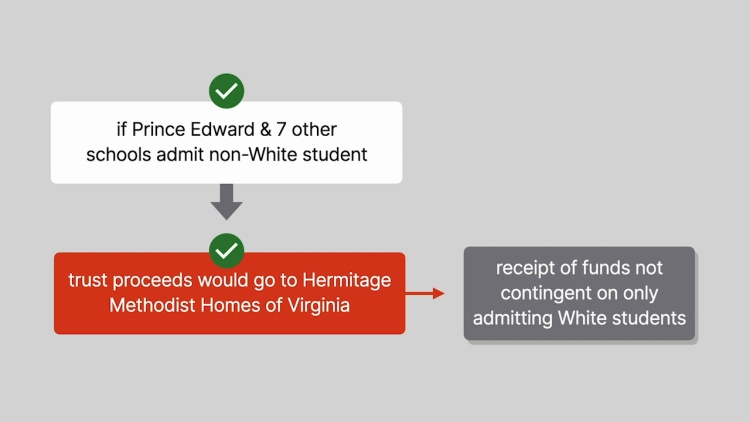Hermitage Methodist Homes v. Dominion Trust Co.
Virginia Supreme Court
387 S.E.2d 740 (1990)
- Written by Rebecca Green, JD
Facts
In 1968, Jack Adams died, leaving a will providing that the residuum of his estate be held in trust and the income be provided to Prince Edward School Foundation (Prince Edward) (defendant) “[s]o long as [Prince Edward] admits to any school, operated or supported by it, only members of the White Race.” The will went on to state: “in the event that” Prince Edward admitted any person who was not a “member of the White Race,” all income accruing after that date should be paid to seven different successive schools (defendants), all subject to the same contingency. The will’s final beneficiary was Hermitage Methodist Homes of Virginia (Hermitage) (defendant), without any contingencies. In 1987, the trustee, Dominion Trust Company (plaintiff), filed suit asking the court to interpret the will to determine the rights of the parties. There was no dispute that each of the schools had admitted a person who was not a “member of the White Race.” Prince Edward argued that the discriminatory provisions were invalid and unenforceable and that giving effect to the primary charitable intent of the testator to promote education means paying the trust income to Prince Edward. Hermitage argued a determinable event had occurred for each of the schools, and as final beneficiary without any such contingencies, Hermitage was entitled to all future trust income. The trial court found the racially discriminatory conditions of the trust were void, but the rest of the trust was valid. The court then declared Prince Edward should receive the trust income. Hermitage and two of the losing schools appealed.
Rule of Law
Issue
Holding and Reasoning (Compton, J.)
What to do next…
Here's why 899,000 law students have relied on our case briefs:
- Written by law professors and practitioners, not other law students. 47,000 briefs, keyed to 994 casebooks. Top-notch customer support.
- The right amount of information, includes the facts, issues, rule of law, holding and reasoning, and any concurrences and dissents.
- Access in your classes, works on your mobile and tablet. Massive library of related video lessons and high quality multiple-choice questions.
- Easy to use, uniform format for every case brief. Written in plain English, not in legalese. Our briefs summarize and simplify; they don’t just repeat the court’s language.





